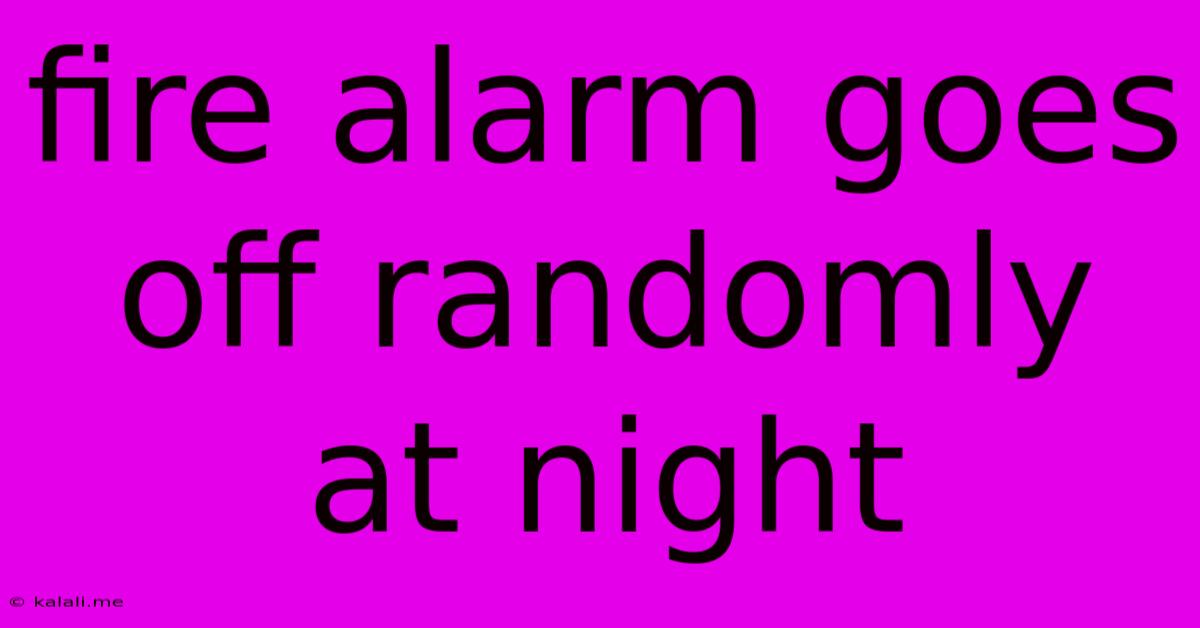Fire Alarm Goes Off Randomly At Night
Kalali
May 29, 2025 · 3 min read

Table of Contents
The Nightly Nightmare: Why Your Fire Alarm Goes Off Randomly at Night
A piercing shriek in the dead of night. Your heart leaps into your throat. It's the fire alarm, and it's not a fire drill. The terrifying experience of a randomly going-off fire alarm in the middle of the night is unfortunately more common than you might think. This article explores the common culprits behind these unwelcome nighttime disturbances and offers practical solutions to restore your peace of mind. This guide covers troubleshooting, maintenance, and preventative measures to help you identify and fix the problem.
Common Causes of Random Fire Alarm Activations at Night
Several factors can trigger a seemingly random fire alarm activation. Understanding these causes is the first step towards solving the problem.
-
Dust Accumulation: This is perhaps the most frequent culprit. Dust, debris, and even insects can accumulate within the smoke detector's sensor, leading to false alarms. The fluctuating temperature and humidity at night can sometimes dislodge particles, triggering the alarm.
-
Low Battery: A weak battery can cause erratic behavior. While a low-battery chirp is common, sometimes the alarm malfunctions entirely and triggers a full alarm.
-
High Humidity or Moisture: Excessive moisture in the air, perhaps from a steamy shower or cooking, can interact with the sensor and cause a false alarm. This is especially true in older models.
-
Temperature Fluctuations: Dramatic temperature changes during the night, particularly in poorly insulated homes, can affect the sensor's sensitivity and lead to accidental activation.
-
Faulty Wiring: In some cases, faulty wiring within the alarm system itself can cause intermittent problems, leading to random alarms at night.
-
Cooking Odors: Strong cooking smells lingering in the air, especially from burnt food or strong spices, might trigger the alarm, especially if the sensor is sensitive.
-
Out-of-Date Smoke Detector: Older smoke detectors may be more prone to malfunctions due to wear and tear on internal components.
Troubleshooting Your Fire Alarm: A Step-by-Step Guide
Before calling a professional, try these troubleshooting steps:
-
Check the Battery: Replace the battery, even if it seems fine. A seemingly functioning battery can still be weak. Use a fresh, high-quality battery.
-
Clean the Smoke Detector: Carefully vacuum or gently brush away any dust or debris from the sensor. Avoid using harsh chemicals.
-
Test the Alarm: After cleaning and replacing the battery, test the alarm according to the manufacturer's instructions. A successful test ensures the alarm itself is functioning correctly.
-
Check for Moisture: Inspect the alarm for any signs of moisture. If present, allow it to dry completely before testing.
-
Investigate Environmental Factors: Consider recent changes in your home environment, such as cooking activities or unusual humidity levels.
-
Consider the Age of the Detector: Older smoke detectors are more prone to malfunction. Replacing them every 10 years, as recommended, is essential.
Preventative Measures for a Peaceful Night's Sleep
Proactive measures can drastically reduce the chances of future nighttime fire alarm disruptions.
-
Regular Maintenance: Clean your smoke detectors regularly, ideally every few months, to prevent dust build-up.
-
Battery Replacement Schedule: Set a reminder on your phone or calendar to replace batteries every six months, regardless of the alarm's chirp.
-
Upgrade to Newer Models: Consider upgrading to newer smoke detectors with improved technology and features that minimize false alarms. Look for models with smart features that offer alerts on your phone.
-
Proper Ventilation: Ensure adequate ventilation in your kitchen and bathroom to reduce humidity.
-
Professional Inspection: Schedule an annual inspection of your entire fire alarm system by a qualified technician to identify and address any potential wiring or system issues.
By understanding the causes of random fire alarm activations and taking proactive measures, you can significantly reduce the likelihood of experiencing these unwelcome nighttime interruptions. Remember, a well-maintained fire alarm system is crucial for your safety, but unwanted alarms can be just as disruptive. Following these tips should restore peace and quiet to your nights.
Latest Posts
Latest Posts
-
How Did Simon Die In Lord Of The Flies
May 31, 2025
-
Furnace Blowing Warm Air Not Hot
May 31, 2025
-
You Re And You Didnt Even Know It
May 31, 2025
-
How Do You Clean A Shingle Roof
May 31, 2025
-
Do I Cite Publisher In Essay
May 31, 2025
Related Post
Thank you for visiting our website which covers about Fire Alarm Goes Off Randomly At Night . We hope the information provided has been useful to you. Feel free to contact us if you have any questions or need further assistance. See you next time and don't miss to bookmark.